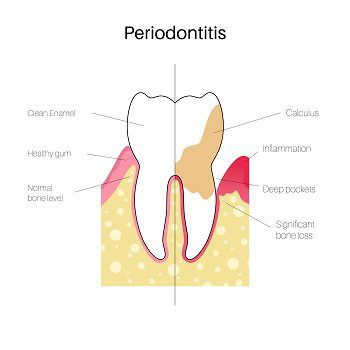What Are Periodontic Treatments?
Periodontics can be stopped if treated well on time. However, regular dental checkups and maintaining good oral hygiene can significantly contribute to its post-treatment phase. If you suffer from periodontics, it’s good to look for treatment options before it gets too late. This article will discuss several periodontics diseases, their symptoms, and periodontic treatments for your enlightenment.
Six Types Of Periodontics Diseases:
- Gingivitis - When gums become unhealthy, they turn red and bleed easily; then, gingivitis can result.
- Periodontitis - Is an advanced gum disease affecting the gum tissue and the gum line. It also deteriorates the jawbone.
- Aggressive Periodontis - When periodontitis progresses, it results in aggressive periodontitis. Here, the jawbone is destroyed at a higher pace.
- Chronic Periodontitis - In this disease, the gingival tissues are inflamed, resulting in bone loss.
- Systemic Periodontitis - Periodontal disease can also develop because of systemic diseases, like diabetes, respiratory disease, or heart ailment.
- Necrotizing Periodontal Disease - This disease is common in people who suffer from systemic diseases or have conditions like malnutrition, immunosuppression, and HIV.

Symptoms of Periodontics:
- Loose Teeth
- Bad Breath
- Swollen or Red Gums
- Tooth Sensitivity
- Painful Chewing
- Unpleasant Taste
- Gums That Bleed Easily
- Pus Between Gums and Teeth
Treatment Options For Periodontics
- Scaling And Cleaning:
This treatment aims to remove calculus and plaque to restore periodontal health. In this treatment, the healthcare professional will do scaling and debridement to clean the area below the gum line adequately. Root planing is also done to smoothen rough areas lying at the roots of the teeth.
- Medications:
Several medications can be used to treat periodontics. These could be in the form of mouth rinse, antibiotic gel, antiseptic chip, antibiotic microspheres, enzyme suppressant, or oral antibiotics. The antimicrobial mouth rinse helps to control bacteria while treating gum disease. The antibiotic gel helps shrink periodontal pockets and minimize the prevalence of bacteria in the mouth. After the root planing procedure, the antiseptic chip is mainly placed in the periodontal pockets. The antibiotic microspheres are slow-release medications used to control bacteria and are usually put into the bags after scaling and root planing. The enzyme suppressant helps delay the body’s enzyme response and is generally taken orally as a pill. Oral antibiotics are helpful to treat acute or locally persistent periodontics disease and are available both in tablet and capsule form.
- Surgical Inventions:
If the non-surgical treatment options do not work, surgical interventions might be needed. These include:
- Flap Surgery - It is done to remove calculus from the deep pockets.
- Tissue and Bone Grafts - This procedure restores bone and gum tissue that is destroyed due to the disease.
How To Prevent Periodontics?
- Brush your teeth at least twice a day and use regular dental flossing.
- Get regular dental cleanings to avoid the onset of the disease.
- Use fluoride toothpaste and a therapeutic mouthwash. Do not forget to consult your dentist in this regard.
Final Thoughts
When diagnosed with periodontics symptoms, see your dentist without any delay. Though periodontic treatments has a high success rate, it is essential to maintain good oral hygiene afterward. Visit your dentist regularly and follow his instructions to attain a positive outcome.
Contact your Danville dentist, Dr. Hoss Abar, DDS, MSD at Danville Orthodontics now to learn more about periodontics treatment.
Resource:
How do orthodontic treatments work?
*Neither this nor any other content in this media is meant to prescribe, recommend, or prevent any treatment or procedure. We highly recommend that you get the advice of a qualified dentist or other medical practitioners regarding your specific dental condition.*
